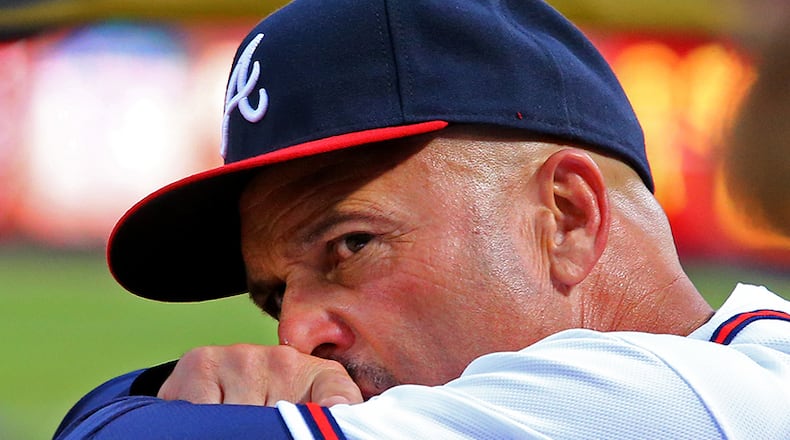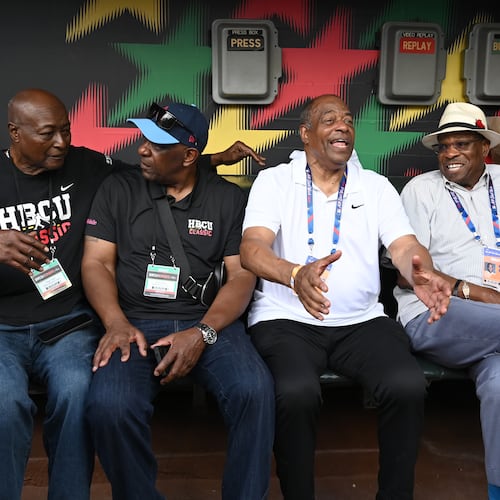The Braves are bringing back manager Fredi Gonzalez for 2015, deciding that his body of work over four seasons as Atlanta manager outweighed a second September collapse that kept Atlanta out of the postseason this year.
“I’m glad I got the opportunity to come back and take another shot at getting us back into the postseason,” said Gonzalez, whose Braves won 96 games and a division title in 2013, before falling to 79-83 this season. “There’s no other place that I covet, no other place I want to manage.”
Braves interim general manager John Hart also announced Friday that former Astros manager Bo Porter has been hired as third-base coach, replacing Doug Dascenzo. The Braves aren’t bringing back Dascenzo or assistant hitting coach Scott Fletcher, and hitting coach Greg Walker stepped down Monday.
The rest of the coaching staff returns including pitching coach Roger McDowell, bench coach Carlos Tosca, first-base coach Terry Pendleton and bullpen coach Eddie Perez.
The Braves have not hired a new hitting coach or coaches. Gonzalez said he was putting together a list of possibilities, as were Hart and assistant general manager John Coppolella. The three will get together during the Braves’ retreat at Sea Island Sunday through Tuesday and begin to finalize a list of candidates.
Criticism of Gonzalez from fans reached a crescendo during the second September collapse in Gonzalez’s four years at the helm. The team dropped from the National League wild-card race when it lost 16 of its first 20 September games while being shut out six times in that span
The Braves hit a majors-worst .206 in what was one of their worst months since moving to Atlanta in 1966.
General manager Frank Wren, architect of the dysfunctional offense, and assistant GM Bruce Manno were fired with a week left in the season, the day after the Braves were eliminated from postseason contention.
After winning the NL East title in 2013 – their first division crown since 2005 – the Braves finished 17 games behind Washington this year in only their third losing season since 1990. All three of those losing seasons came in the past nine years, the others under legendary manager Bobby Cox in 2006 (79-83) and 2008 (72-90).
At a Sept. 22 news conference to announce Wren’s firing, each member of the three-headed “transition team” of Braves president John Schuerholz, Hart and Cox – especially Cox – made it clear Gonzalez was not viewed in a similar light as Wren.
“I think Fredi has done a remarkable job since he’s taken over from me in 2011,” said Cox, who has recently become more involved in his Braves advisory role. “I think he’s just been outstanding. There were difficult times, even last year to win 96 games with things that were taking place.”
Asked if that meant he’d give a vote of confidence for Fredi to the next GM, Cox said, “Yes, absolutely.”
Schuerholz said on Sept. 22 that Wren’s replacement would likely have a say in any decision regarding the manager, traditionally the case when a team hires a new GM. “Whoever the new general manager is ought to have that opportunity and that responsibility,” Schuerholz said at the time.
Given the team’s announcement Friday that that Gonzalez will be back, it could indicate that Hart or Coppolella will be the next GM, or that the Braves will hire a GM with no objections to Gonzalez continuing as manager.
When Hart was asked on Sept. 22 about Gonzalez and the pending decision whether to retain him, Hart said, “Certainly a general manager is going to have some input into it, but I think that you heard Bobby — there’s no ill will here toward Fredi. He’s a terrific guy… I don’t want to put the cart before the horse here with Fredi. Nobody’s happy with (this year’s record), most of all Fredi for sure – but I think there’s a lot of other decisions that are going to be baked into the cake when you make your managerial evaluations.”
Asked Friday about having Cox’s support, Gonzalez said, “I think that was great to have. But I think, knowing John Schuerholz and getting to know John Hart, and the Braves way, I think they were going to make the right decision. If they felt I deserved another opportunity, they were going to do that.”
While some observers – both inside and outside the organization – wondered if Gonzalez had “lost the clubhouse” and whether the team quit on him in September, veteran backup catcher Gerald Laird said that wasn’t the case. He thought Gonzalez should keep his job.
“You can’t really blame him for one bad year,” Laird said last weekend in Philadelphia, “and I’d like to see him get a chance to manage a team to where I think he’s going to get more control.”
That was presumably a reference to reports that Gonzalez felt pressure from Wren to play some players, or wasn’t consulted before some roster decisions.
“I just feel like he deserves a chance to go out there and show who he is,” Laird said. “In my opinion, he deserves it. He’s had a lot of success as a manager. He deserves another year or two, and see what happens next year. You can’t put all the blame on him…. We’re all professionals, we know we didn’t have the best of years.
“I don’t think any of us on this team are satisfied with what we did offensively. I mean, obviously Justin (Upton) had a great year, but I’m telling you if you ask around, a lot of these guys could tell you they honestly think they could have done more. So to put the blame all on the manager? It doesn’t seem fair to me.”
For many of the team’s followers, the latest September swoon was all too similar to Gonzalez’s first season as Braves manager in 2011, when they went 9-18 in September and were eliminated from the postseason race on the final day of the season.
The main difference was that the Braves led the wild-card race by 8 ½ games on the morning of Sept. 6, 2011. This year they were tied with Milwaukee for the second wild-card spot by that point, already six games behind Washington in the division standings.
Despite their disappointing season, the Braves have the fifth-most regular-season wins (358) during Gonzalez’s tenure, behind the Tigers (366), Cardinals (365), Yankees (361) and Nationals (360). Of the top five, only the Braves and Nationals haven’t won a playoff series in that span, and the Nationals are back in the postseason this year.
The Cardinals and Tigers have a combined total of 11 postseason series wins in the past three years, and both are back in the playoffs.
In eight seasons as a manager he has three top-five finishes in NL Manager of the Year balloting, including third place a year ago. This spring, Gonzalez was rated by his peers as the league’s third-best manager in a Baseball America survey.
Those who have a lesser opinion of him as a manager often cite Gonzalez’s lineup decisions as a primary reason. In an age when baseball managers and front-office officials are using ever more advanced statistics and analytics to build rosters and construct lineups, he often goes on gut feelings and frequently posted lineups that infuriated fans and puzzled plenty of others.
First and foremost: B.J. Upton. The center fielder’s .208 average was the worst among qualified National League hitters, his strikeout rate of one every 3.4 plate appearances was tied for the highest in the league, and his .287 on-base percentage was tied for fourth-lowest in the NL.
Gonzalez continued to play Upton, who was in the second year of a five-year, $75.25 million contract, almost every day until the final two months of the season. After that he played him about three out of four games the rest of the way despite the July 31 trade acquisition of Emilio Bonifacio, an experienced leadoff hitter and center-field option.
And it wasn’t just that he played Upton for 135 games in center field despite having Jordan Schafer as an option for most of the season and Bonifacio for the last two months, it was that Gonzalez batted Upton in the leadoff spot for 36 games and in the second spot in the order for 55 games.
Among the other questionable lineup decisions: Andrelton Simmons hit .244 with the league’s fourth-worst OBP (.286), and Gonzalez batted him second in 35 games and had him hit leadoff in one game. Chris Johnson batted cleanup in 17 games and batted fifth in 44 games, and finished the season with just 10 homers and a .361 slugging percentage that equaled that of Phillies leadoff hitter Ben Revere.
The day after the season ended, Gonzalez was asked about the difficulty of putting together a lineup without a prototypical leadoff hitter and with so many hitters struggling simultaneously for much of the season.
“It was a challenge every single day,” he said. “Collectively, we didn’t produce offensively. Our pitching was good the whole year. That’s a constant that really kept us there all year. But offensively we just didn’t do the same thing we did last year. We didn’t score runs, we didn’t hit home runs….
“You can’t say, ‘Take this guy out of the lineup and put this guy in, it’ll be better.’ At times there were, like you said, five or six guys that struggled. For whatever reason, we didn’t produce.”
Gonzalez has a 634-569 record in 7 1/2 seasons as a major league manager, including 358-290 in four seasons with the Braves. They led the NL in wins (279) during 2011-2013 in his first three seasons as Braves manager.
Until this year his teams had improved their wins total in each of Gonzalez’s full seasons as a major league manager – from 71 wins in 2007 with the Marlins, to 84 in 2008, 87 in 2009, 89 in 2011 in his first season with the Braves, 94 in 2012, and 96 wins in 2013. His 2010 Marlins were 34-36 when Gonzalez was fired.
Four months after the Marlins dismissed Gonzalez in June 2010, the Braves hired him to succeed his mentor, Cox, who retired after the 2010 season as the fourth-winningest manager in history, and was induced this year into the National Baseball Hall of Fame.
Gonzalez spent his first 3 ½ seasons as a big-league manager with the Marlins in Miami, the town where he was raised after being born in Havana and coming to the United States as a young child when his parents defected from Cuba. The former catcher graduated from Miami’s Southridge High in 1982 and was selected by the Yankees in the 16th round of the 1982 draft.
He played six minor league seasons before beginning his coaching career in 1990 as manager of the Single-A Miami Miracle, an independent-league team.
Gonzalez and his wife and two children moved to the Atlanta area (Marietta) during Gonzalez’s four-year stint as third-base coach on Cox’s staff in 2003-2006, and have never left. He and his family continued to make Marietta their permanent home when Gonzalez managed the Marlins.
About the Author
Keep Reading
The Latest
Featured



